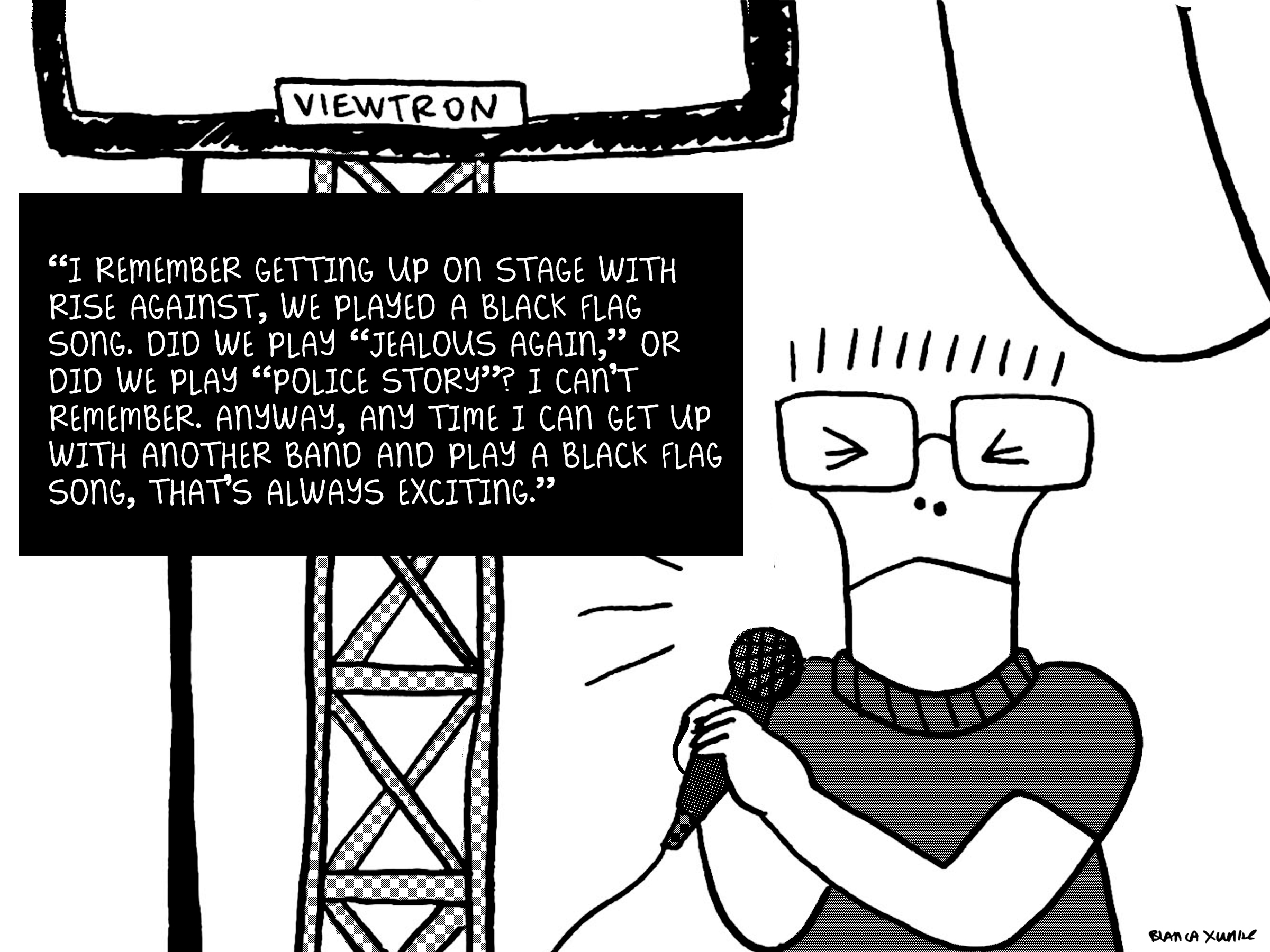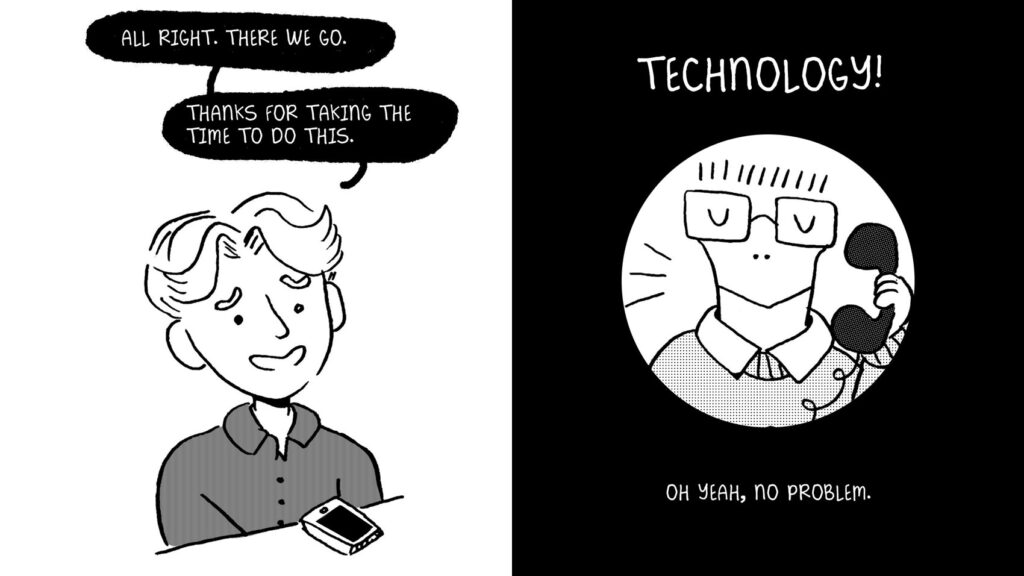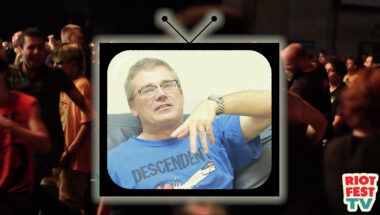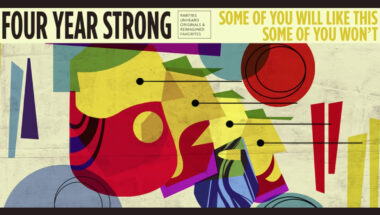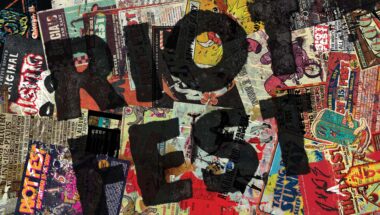Milo Aukerman is sitting in a different seat than he was five years ago. The widely beloved frontman/geek caricature of Descendents has always juggled touring and recording with a scientific career at DuPont University teaching and researching biochemistry. Descendents fans have always been accustomed to a bit of a wait as a result, with release gaps usually running 7 years or longer. 1996’s Everything Sucks was the group’s first studio effort since 1987; it’d be another 8 years until Cool to Be You followed.
Flash forward to present day and Aukerman is wearing a hat that’s never quite stayed on for long: he’s a career musician. After getting laid off from DuPont University and hanging up the lab coat for good, the group is now working on a follow-up to 2016’s Hypercaffium Spazzinate in what feels like record time for a Descendents record. It’s a focus that Aukerman has never been allowed, a comfort that sounded very welcome when I talked to him over the phone.
We got Milo on the line to tell Riot Fest about the next Descendents record, his “magnum opus” of fart songs, and how his songwriting is reflecting a bit more than just girls and greasy food these days—and, in the spirit of Milo’s cartoon persona, comic artist Bianca Xunise has illustrated sections of the interview. Dig in.
RIOT FEST: If you had to guess: how many times do you think you’ve played Riot Fest?
MILO AUKERMAN: I think this might be the third… or maybe fourth! Maybe fourth time. We did like the whole Milo Goes To College record… Yeah, maybe it’s maybe five. I think we did it in two separate cities before, and then we’ve also played Riot Fest East—and then we just played regular Riot Fest. I think we’re going on five or six at this point. It’s very exciting; we just love the festival. Every year it seems to get better and better.
This is actually–and I found this out last night—this will be your 11th Riot Fest.
11th?! 11? That’s craziness! I can’t even imagine… I guess they start to blur together. But they’re always great!
Yeah. This is the 5th one in Chicago, so you were right on that. But it was 2012 that we did [Riot Fest] Brooklyn, Dallas, Toronto…
Oh yeah, I forgot about all the other sites. The Brooklyn one got canceled, we didn’t really play. There was a tornado, so we were slated to play the Brooklyn Riot Fest, but the tornado meant that half the bands didn’t get a chance to play. Kind of an interesting little Riot Fest factoid.
Jeez.
A tornado in Brooklyn. That’s kind of even more weird.

This is also, I noticed, the longest gap in years you’ve gone without playing Riot Fest. But this is kind of a different year for you guys. Before, you’d do some shows or a tour, and then you’d go back to doing research at DuPont. Now you’re all in with the music side of things—which, technically, you’ve never really done.
Yeah, I got laid off in 2016, so the last three years had been more full-time band. Having said that, we spent the last few years doing more club dates around the U.S., and we would do festivals in Europe. But we didn’t hit too many festivals here in the states, So it’s good to get back to some festivals. I like playing festivals ‘cause you get to see so many bands, and everyone’s just having a big old party.
You’ve mentioned a few times that you’re working on a new record.
Yeah, we’re working on it. The big difference between this time and the last time is that for the last few records, we spent many, many years of just being… I’d say fallow. Basically, the band was mothballed. But now, we’re kind of a functioning entity through this whole period. Having said that, we still take our time with records, because we want to get it done right. We don’t want to rush anything. We don’t have anyone breathing down our necks saying, “Oh, you need to put another record out.” So we kind of go, “Well, it’s going to come out when it comes out.” All we’ve been saying so far is it’s gonna come out within the next few years. I don’t like to even put any more of a timeline on it.
We’ve always worked on the basis of “Who’s got songs?” Oh, you’ve got songs? Cool. Maybe I’ll do some songs—and then we’ve all got songs! That’s cool. Let’s do the record.” And so it’s one of those things where we don’t go in there without any songs. We’re not going to ever go into the studio and say, “Okay, let’s write some songs.” We’d never really worked that way, and to this day we’re just gonna keep doing that.
What I can say is that I’ve got songs and that Stephen [Egerton]’s got songs. We’re just kinda figuring that eventually, Bill [Stevenson] and Karl [Alvarez] will write songs as well, and that’ll be cool. We can’t really call it a Descendents record until all of us are fully contributing. So we’re waiting on Bill and Karl, but I’m sure they’re going to come up with some stuff.
What feels different now in your songwriting? With Hypercaffium Spazzinate, there were a lot of themes that were, uh, updated—The Fat EP in ‘81 had “I Like Food,” and then flash forward 37 years later, you have songs like “No Fat Burger” saying you can’t have those greasy fries.
That was the updated version. We updated the song. I think we still have some of the same passions. Like, I wrote a song about coffee—like, okay, do we really need another song about coffee? But I did it. [Laughs] Because it’s still a big passion of ours.
A lot of things are different. We’re all happily married and we all have different types of relationships now than we had in the past. We’ve got kids, so songs about our kids or songs about our wives… I mean, it becomes a lot of a different thing. We’re no longer writing about, “Oh baby, you left me!”
The other thing we’ve got now, which is a little different… obviously politics change, but I think when we were writing songs, we were a little kind of focused on food, fishing and girls. Now, personally, I’m a little more focused on what’s happening with the world, and the state of the world. That’s reflected in our songs. I think our more recent songs, too, where I feel like I need to comment on what is going on more. If you want to say politically I guess that’d be the right word for it.
Nowadays it’s kind of “uncool” to be silent on politics.
The way I view it is—for me, personally—I’ve always viewed myself as kind of left-of-center. But I almost feel like now it’s shifted to being extreme left. It’s not like my views changed, it’s that the world changed. I feel like, “How did I all of a sudden become extreme left, when I’ve always been left-of-center?” It’s because our political landscape has shifted. It’s just scary to me to see, to think that I’m this radical leftist when I’m not really—it’s just that that’s what we’re up against. We’re up against this extreme right that we have to deal with, and to me it’s like, “Wait a minute! I just want to be that kind of left-of-center kid.” We’re in kind of a zone of “save the country.”
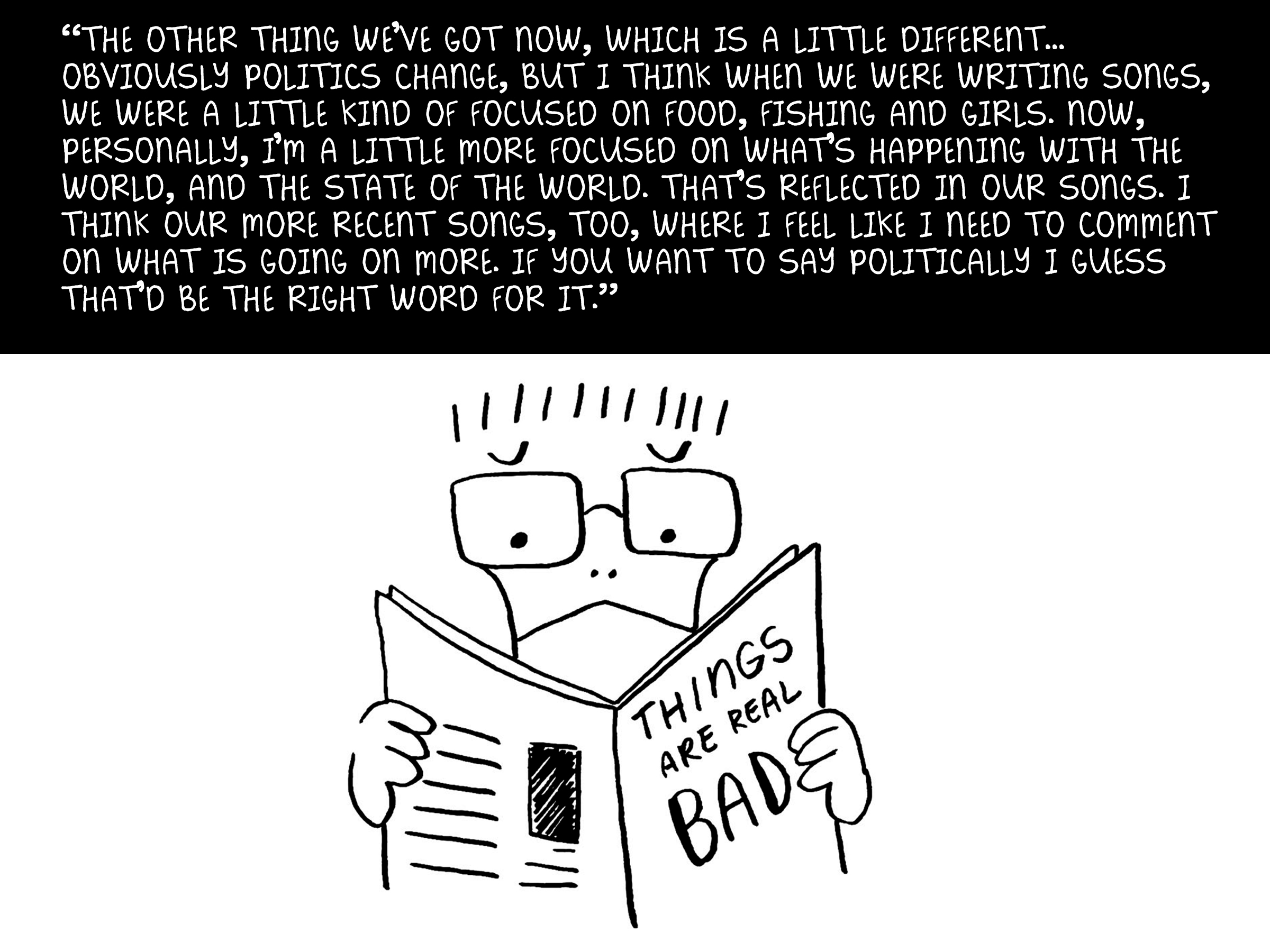
I feel like if I’ve got to be more radical to save the country, it’s what’s going to have to happen. You know? I can’t save it myself, but I’m just saying we all have to pitch in, see what’s happening, and try and save the country from what’s going on right now. It’s really, to me, very concerning. Like, growing up when I was a teenager, I could’ve railed against Reagan. Reagan was kind of a dick, or whatever, but he wasn’t threatening to tear down the democratic institution that we have in this country. And I feel like that’s where we’re at now. It’s just a whole different ball game. It’s a whole different kind of scary moment than what we were dealing with, say, Reagan.
My first time listening to Milo Goes To College in high school made me feel like it was relevant then. But now I’ll listen to “Suburban Home” and actually feel the irony of it fresh out of college—“Wouldn’t it be funny to have a yard? Or own property?” my friends and I will joke, as if it’ll ever happen.
We were fortunate to have Tony in the band, who—while we were 17 or 18 years old—was considerably older. I think he was dealing with more adult kind of problems and challenges, and “Suburban Home” kind of reflects that. He was just like, “Oh man, I want to buy this house. I want to have this house, and I gotta live in suburbia.” And then by the time the song is done, it’s pretty clear that he’s okay with it. Like, “Yeah, that’s what I want. I want a suburban home.” Which is kind of the tongue-in-cheek bit about it: Some people think it’s anti-suburbia, but he’s actually embracing suburbia in the song. And that was his challenge as an adult. Meanwhile, this other three of us were still living at home and were like, “This is a great song, Tony! It’s kind of funny.”
There was a lot of stuff in Hypercaffium about each other, a lot of reflection on getting laid off—stuff that you’re suddenly writing songs about. But there’s things like coffee that you’re still talking about 37 years later.
It’s cool, ‘cause I still feel passionate about it. Thank God for the Craft coffee bit. I mean, early on we were just making bonus cups—We were really psyched about our Bonus Cups. And then Starbucks came along, and we were like, “Whoa, okay! now we’re now we’re getting real!” You know? And of course, they took over the world or whatever, but there’s still all this great coffee you can get, and all these little mom and pop places too. It’s just a fun thing to obsess over and get some creative oomph out of. I wrote a song for this record that’s kind of a goofy take on coffee. It’s our latest take on the whole thing. I haven’t written any food songs yet. I probably won’t… probably won’t. But we at least got into coffee.
What’s your coffee intake like now? Any different?
Well, what I like to do—especially when I’m touring—is keep it to the point where I’m mainly just having coffee right before I play. But then, of course, right before I play, we’re all drinking like five, six cups, seven cups of coffee. We’re all chugging coffee a half an hour before we go on, just getting all wired out. And it’s great, we’re all on the same page. But the rest of the day, in order to maintain some sensitivities and and not get all coffee tolerant or whatever, I don’t drink coffee for the most part. I have like one cup in the morning, but I try to keep my system clear of it so that when I hit it really hard half an hour before the set, it really gives me a good buzz, a good jolt.
I didn’t drink coffee up until two years ago, when my girlfriend started working at this amazing coffee place that gives her a pound of coffee a week for free. So I’m still learning when’s the right time to “get that buzz.”
Yeah, we obviously have to drink coffee fairly late at night, because we’re then gonna go on. So then afterwards becomes an issue. I just try to have a beer and mellow out as best I can afterwards. But yeah, it’s a constant challenge of… I mean, it’s a drug, right? So we’re drugging up before we go on. And that means you gotta deal with the consequences after the show. Sometimes it can be bad when you don’t go to sleep—as a singer, that’s like the death nail. You’ve gotta sleep. Bill goes nuts with it. He’ll have like, 10 espressos. And I try to go, “Well, how much can I have and still be able to sleep afterwards?” as best I can. I’ve had some times where I overindulge and then didn’t sleep, and then the concert the next night was basically wrecked or whatever. It’s like everything in life: moderation, if you can tolerate it.
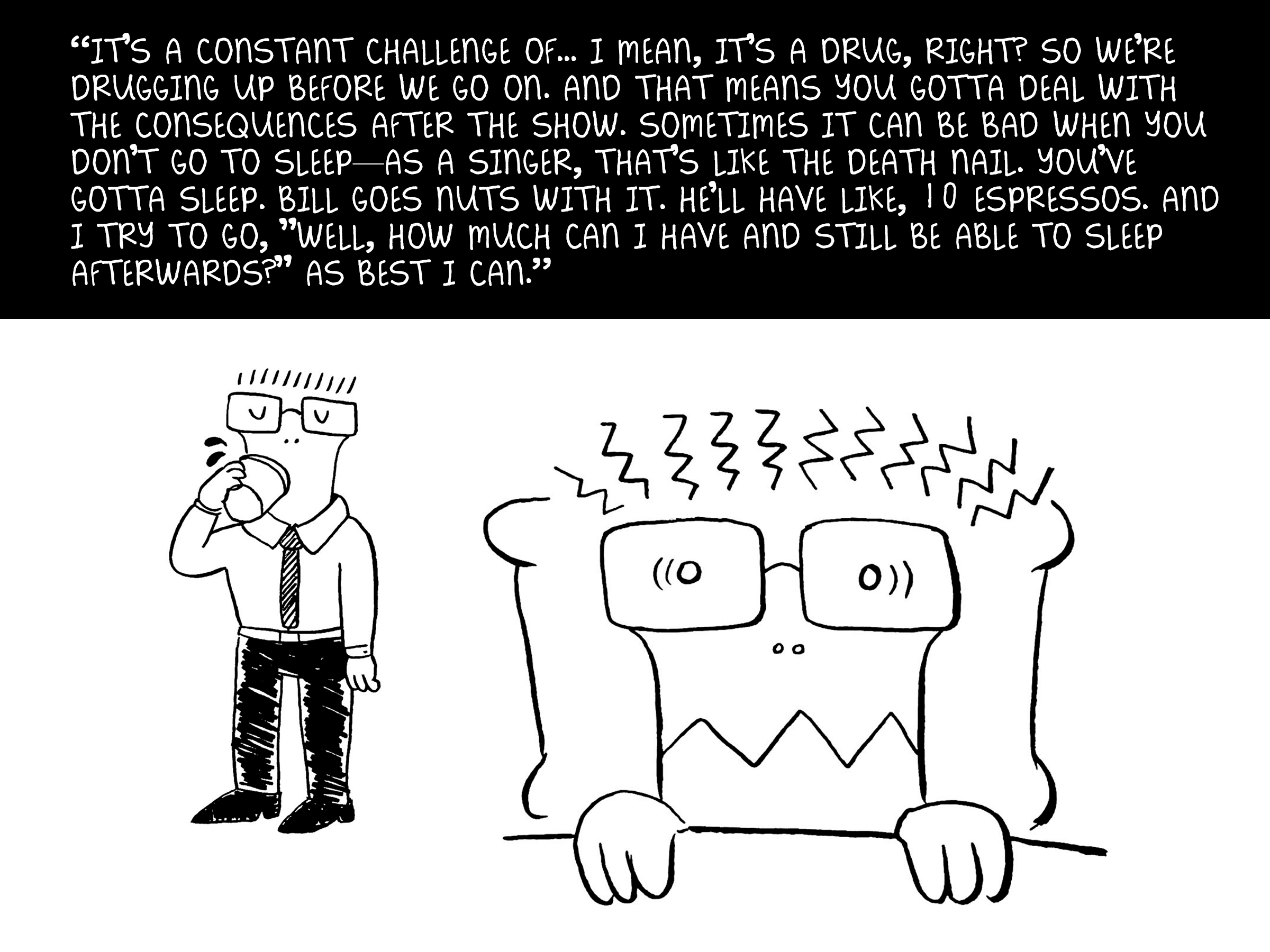
With Hypercaffium Spazzinate… I didn’t think you guys were going to do another record. It surprised a lot of people, myself included. Have the crowds at shows felt any different?
I feel like people can relate to the new songs for sure, if that’s a related question. I never know. I never try to suss out who’s coming, like, “Oh, are these people that just got into us from the new record?” I’m always assuming most of them are aware of our previous stuff. It’d be great if they discovered us through Hypercaffium Spazzinate, and maybe there are some people that did. I just don’t have a good feel for whether that’s the case.
What I do know is that I think we can play these songs live and people can relate to them just as much as the old songs. I think we play about five or six songs off the new record and get a good response, and they’re some of our favorite songs to do. Stephen wrote these amazingly aggressive songs for [Hypercaffium Spazzinate], and those are some of my favorite ones to play live, like “Feel This” or “Victim of Me.” They just bust out of the gate, slam into you, and I love those songs. We did a video for “Without Love”—we play that, and people can relate to it. I think we do a pretty good job of covering the highlights of that record.
At this point in our career, we make a record so that we can have new stuff to play live. We don’t want to just get up there and play stuff that’s 20 years old. We want to play stuff that’s new and exciting for us to play, and relevant, and that’s why we make records. And I think that’s gonna be true with the next record. It’s basically an excuse for us to play some new stuff live.
And there’s probably a lot of material that feels fit for right now. You’ve always referred to your career as something along the lines of “Someday I’ll decide which direction I’m headed in.” Now you’ve parted ways with DuPont, and you’re fully in music. Looking at college through your eyes now, did you like what you got out of it?
I think everything happens for a reason. I went off to school, and then I went off and got a graduate degree, and there were all these things that happened that put the band on hold. Those might have happened for a reason as well, it may have been meant to be that we have these periods where we recharge the batteries. Obviously, I got more out of my college degree than just that—I was fascinated with biology, and fascinated with DNA, and I went and had a career in it. Kind of a mini-career. If you add up all the years of grad school and working at DuPont, it adds up to like 20 plus years, so it’s not so bad. I had some really, really rewarding times, even at DuPont, where I was able to do some really exciting and interesting research.
But when I look back on it now, I kind of go, “Well, maybe it was all meant to be that I left the band, then came back, then left the band, then came back.” Now we’ve learned how we best operate: when we’re not going crazy, playing 300 shows a year, when you’re just wiped out by the end of it. We all need a chance to recharge. We all cherish our home time with our families, and we’ve achieved a certain balance with the music and our home lives where every time we go out and play, it’s like, “This is going to be so much fun. I’m going to see my friends again.” It becomes a vacation, and we want to keep it that way—where we’re going out on the road, it’s a big vacation with a bunch of friends, and it’s just a blast.
Prior to now, I’d say “When it stops being fun, I’m just going to quit.” Now I’ll say, “When it stops being fun, we’ll do fewer shows.” You get to do the amount of shows where it’s still fun, and that’s kind of where we’re at. A lot of bands just end up breaking up because they do too many [shows], and try to pile too much on. We’re not in that mode right now. I guess we’re worldly-wise at this point, and we know what cadence works for us, and that’s what we’re going to do.
So I think that me going to college has, in fact, benefited the band more than hurt the band. It gave us a chance to recharge and come back to it with a fresh set of eyes and ears. Absence makes the heart grow fonder, they say, so that’s kind of my view on it.
It’s weird, to say the least, that music ended up being the more stable job.
Yeah. I feel real fortunate to be able to do that, obviously. If we can afford to choose our own cadence, I feel grateful for that. When I was starting with the band at a very young age, we were teenagers. I’m sure this is probably also the influence of my parents saying, “Okay. Go do this music thing, but you got to have a backup career,” and for me, it was like, “Okay, cool. The backup career is science. I’m going to basically do the music and fall back on the science career.”
Of course, I had it 180 degrees opposite, because the fall back was the music. When the science career started getting sketchy and unstable, it’s like, “Oh, I’ve got the music to fall back on,” so it’s just completely ass-backward. It’s kind of a humorous way of looking at it. Most people don’t view it that way, but I viewed the music as the fallback career when the science failed.
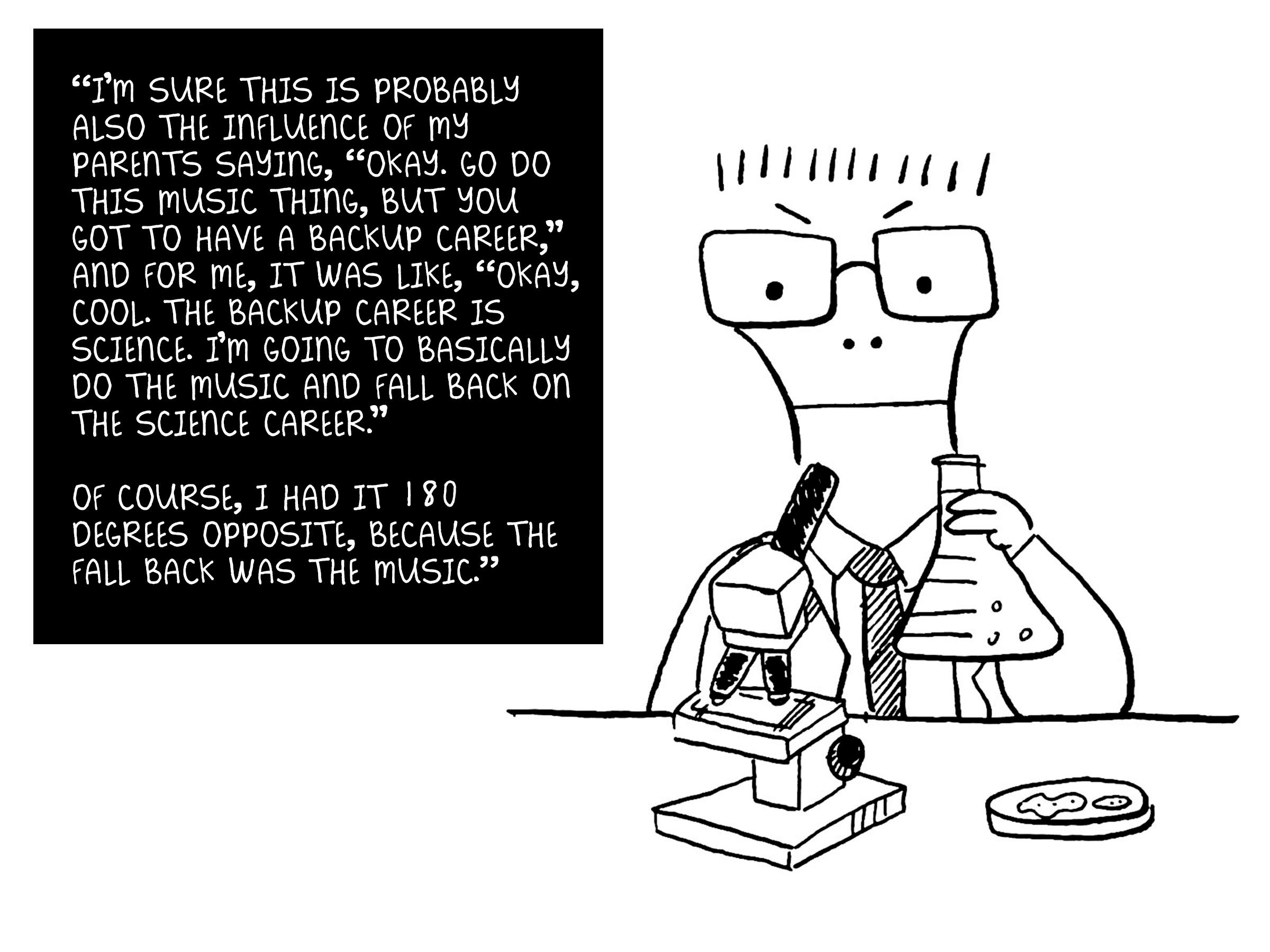
You were doing research on plant bacteria, correct?
Yeah, plant genetics. Studying plant genes, that’s what I got my graduate degree in. I guess my main claim to fame at DuPont—probably my highest profile work—was working on something called microRNAs. I discovered the first plant microRNA, so that was kind of a big splash for me.
Now you’ve got to tell me what a microRNA is.
Well, everyone—humans, plants—we all have RNAs flowing through our bodies. It’s known as the messenger RNA. But RNAs can do more than just serve as messengers to make protein. mRNAs make protein—or I should say direct the synthesis of proteins, which are essential for life. But other types of RNAs perform other types of functions, and microRNAs, as the name suggests, are very tiny. They’re only 21 nucleotides long, and they serve a regulatory role. They can actually affect the stability of other RNAs, and by that manner they control other RNAs’ persistence in the body, and that serves a regulatory function. That’s all bringing back this rusty knowledge that I had probably five, ten years ago.
Your cartoonist is going to have a lot of fun with that, for sure. [Laughs]
Yeah, just drawing a giant diagram of… that. [Laughs]
MicroRNAs themselves aren’t fun to draw, but have [Bianca] draw the microRNA precursor, and that’ll look pretty damn cool. Precursors for microRNAs are pretty cool because they’re hairpin structures.
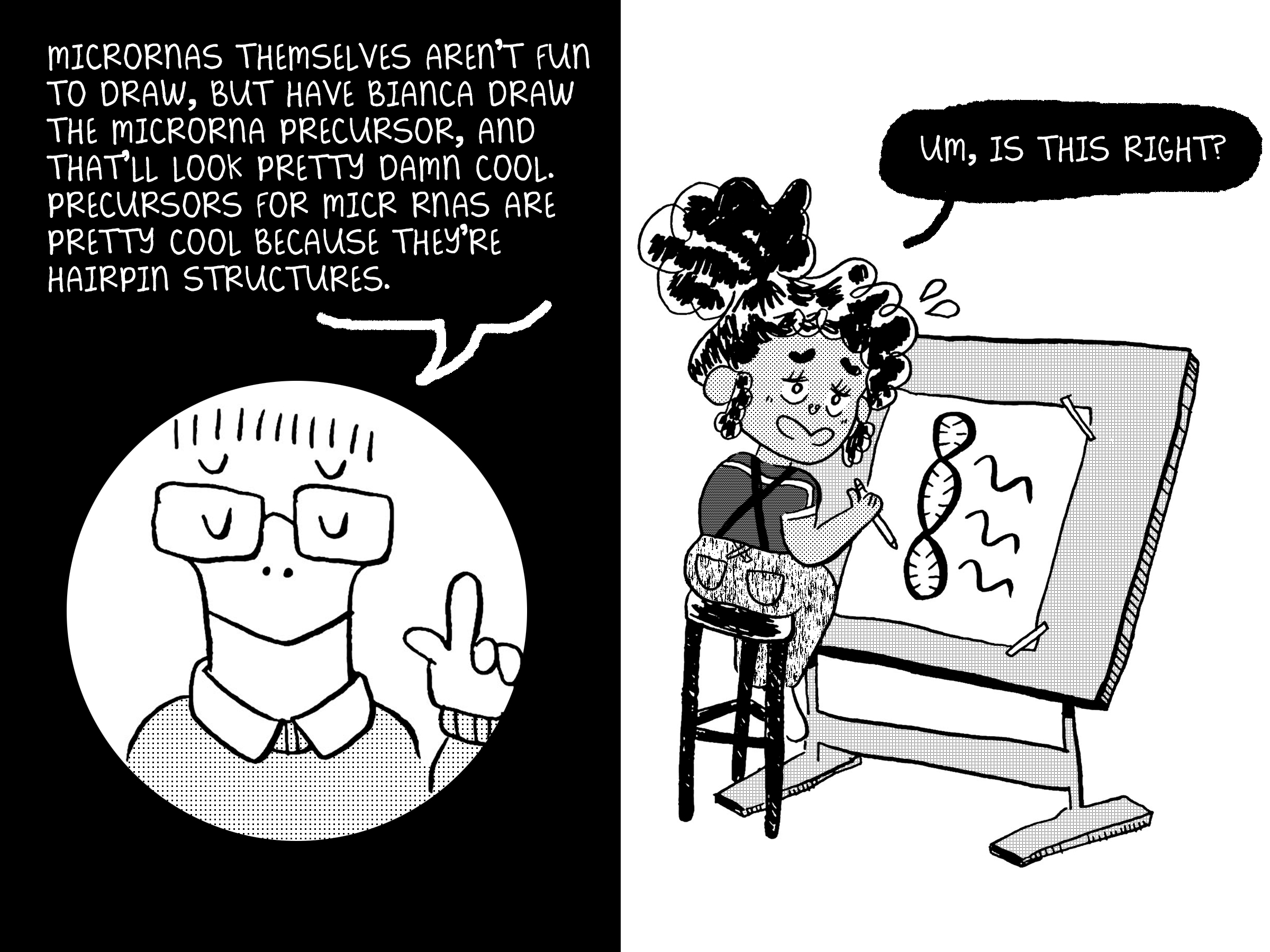
What drew you to plants and plant biology specifically? When did that interest kick off?
Well, in grad school, you rotate through various labs. So your first year in grad school you spend some time trying to figure out what research you want to do and what research lab you want to be in. I did the rotations through a variety of labs. I was initially interested in cancer biology, and then I was interested in vertebrate development, developmental biology… but I rotated through a guy who was working on corn, and he was just a sweetheart. He was the nicest guy, and he was just getting his lab started, had some amazing results, and I just thought, “Well, I’m going to join this guy’s lab. He’s just getting going. I’ll be his first student.”
We made all the buffers on day one that he started, and got the lab running up from the ground level. I found myself doing plant biology when it wasn’t really what I went to grad school necessarily for. But the fit was right between me and my advisor, and I grew to really appreciate plant biology as being an up-and-coming kind of field. A lot more people were in human biology at the time, and plant biology was still kind of a burgeoning area, so I made a go of it there and stuck with it ever since.
I think my career prospects or my job prospects would’ve been better in human biology [or] cancer biology, but I was more fascinated by plants at the time and what you could do with them. And as it turns out, at the time, there was a very healthy biotechnology job market for working on plant biotechnology, GMOs and all that. So I was able to make a go of it at DuPont. It all kind of worked out.
DuPont ended up turning a little sour for me at the end. But I had a good run there, and so I was happy to go that route into biotechnology. But yeah, plants were something where I wasn’t this kind of kid growing up like, “I love plants! I’m going to be a farmer!” or planting stuff. In my house right now, my wife takes care of the plants—I’d probably end up killing them. So it’s not like I’ve got a green thumb or anything, it was just a fascinating biological subject of study. And like I said, the jobs appeared to be there, so it was practically a good idea.
I know for the last record—this is very specific, but I have to know—you wrote a country song about farts for Hypercaffium Spazzinate that didn’t make the cut. Ever since I heard about this, I have been dying to hear it. Have you ever considered a strictly fart-themed Descendents EP? What are the odds of that?
[Laughs] That would be pretty cool! With the stuff that I’m writing these days, we could easily have a political-themed EP, but that’s not as interesting and funny as a fart-themed EP. But I think that may be the last fart song I ever write. I don’t know, it could be. It was kind of my magnum opus.
One of my favorite songwriters growing up was Tom Lehrer. He would write in a variety of styles of the time, and then just write stupid stuff like “Poisoning Pigeons in the Park.” So when I wrote this song, I thought, “It’s a fart song,” but I wanted to do it in a country style because… it’s kind of a romantic fart song. It combines romance and farting in one song. How could it go wrong? That’s what the song is about—and the name, the main chorus line is, “Light a candle, baby.”
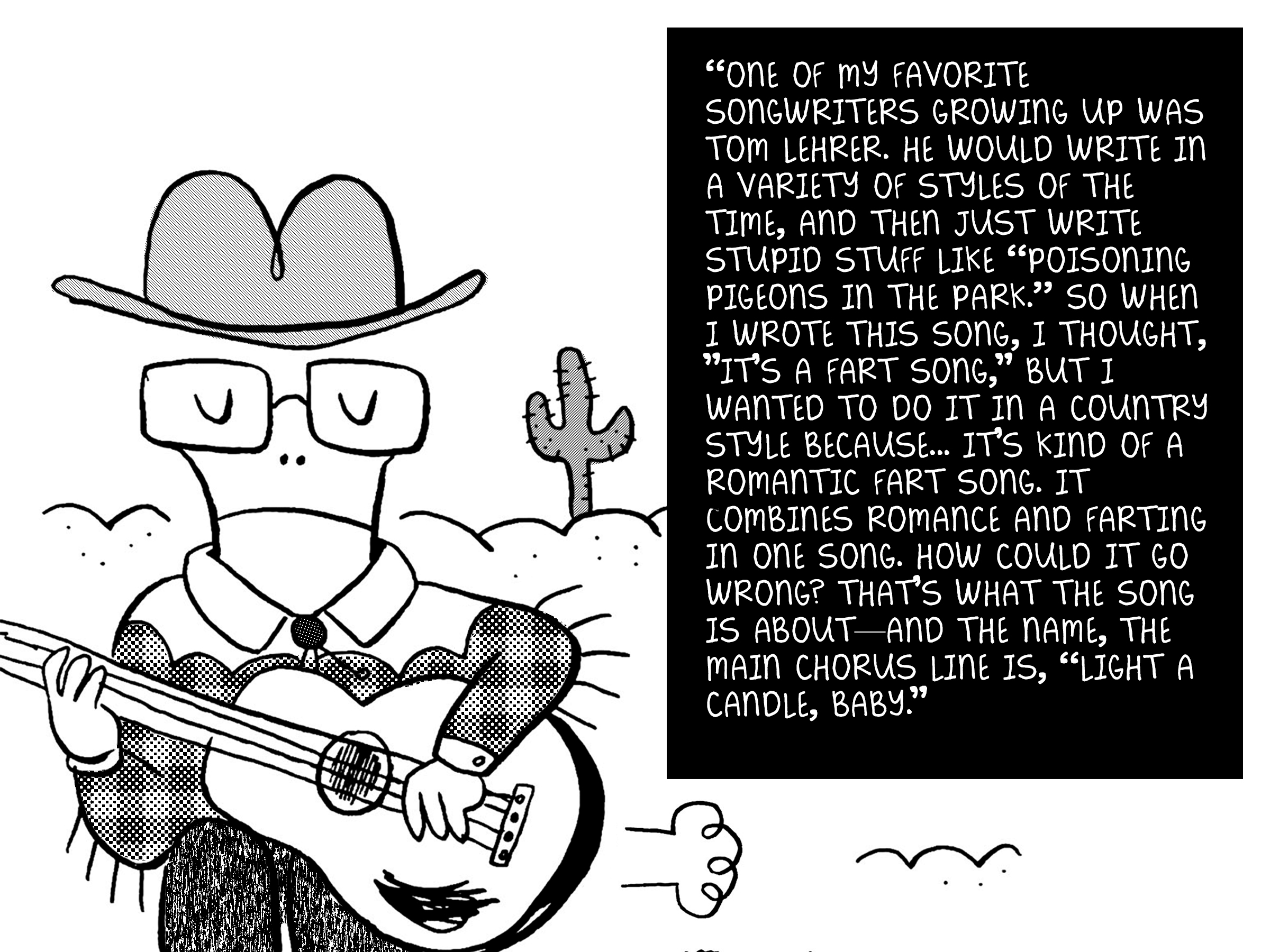
This is too tempting. You have to put this out!
I don’t know about you, but one thing that people do when they’re about to get romantic is they maybe light a candle. But you also light a candle when you’ve got to deal with some “issues,” if you know what I mean. [Laughs] The song writes itself, basically.
Maybe we’ll put it out some day. We have a lot of outtakes. We did [the fart] song, and Bill said, “Okay. We’re going to record this, but the chances it goes on the record are slim because it’s a country song.” It’s not our format. Maybe it comes out some day, because it’s like, “Okay, this isn’t a typical Descendents song, but hey, let’s just throw it out into the world!” It’s a fun song, it’s in a country format—who knows?
I think one of these days we could just scour through our stuff and just put out stuff that is outtakes. We’ve done that in the past—well, we haven’t done it, bootleggers have done it for us, but hopefully we can do it ourselves.
Yes, absolutely. You didn’t tame my interest to hear that song any bit. That’s interesting that you mention a political EP, though—you guys were not a very political punk band to start.
Part of the reason why is we just tend to write about what we’re passionate about, and what we feel. We had this song we put out last year, “Who We Are,” and one of the lines of the chorus is, “That’s how I feel,” and that really is the most important line in the song. “That’s how I feel.” You could not even consider it a political song, it’s just how I feel. Politics are so cold and rational, but how you feel is more important than the politics of it. And how I felt was that I felt like people were getting shit on. I felt like people were getting dumped on, and being abused, and being treated as less than human, so that’s what that song is about. Sure, you could say, “Oh, it’s a political song,” but really it’s more about humanity. It’s about treating people with love and respect.
That’s what I’m getting at with a lot of our new stuff. We’re commenting on the world, but it’s because the world is alarming right now, and the world is really scaring me. I can only write about what I’m feeling, what I’m obsessing about, and so I might write a coffee song one day because I’m obsessed about coffee, but the next day, I’m probably obsessing about the world. I’m obsessing about our country and how fucked up it is, how fucked up it’s getting, and I’m going to write a song, and it’s kind of like I almost feel like I need to apologize. “Sorry, another political song.” I don’t even like to call them political songs, like I said, because it’s just how I feel, and it’s not even necessarily calculatedly political, it’s just how I feel.
Last question: Any Riot Fest memories you’d like to share for our comic?
Well, given that I only remember five out of the eleven shows, it’s looking pretty grim for that. [Laughs]
I remember getting up on stage with Rise Against, we played a Black Flag song. Did we play “Jealous Again,” or did we play “Police Story”? I can’t remember. Anyway, any time I can get up with another band and play a Black Flag song, that’s always exciting. Bill played guitar and I sang, and Tim and I traded off vocals. I think it must’ve been “Jealous Again.” That was a big highlight for me of Riot Fest. I think if we can get on the bill with them again, maybe we’ll repeat it. Maybe we’ll do some more Black Flag. Is Rise on the bill? Rise is on the bill, right?
Rise Against is on the bill….
I’ll have to talk to Tim [McIlrath]… maybe we need to do another Black Flag song.
